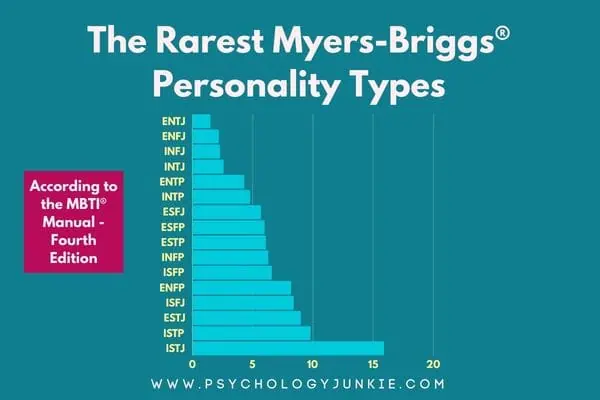How Rare Is Your Myers-Briggs® Personality Type?
“What is the rarest Myers-Briggs type?”
“What is the most common MBTI® type?”

These are questions I get asked daily as an MBTI® practitioner. The answers can be confusing, because statistics and surveys change from year to year. Plus many people feel that being rare is the equivalent of being “best.” Today we’re going to take a look at the rarest MBTI® (Myers-Briggs) personality types as taken from a national sample of 16,773 individuals from 23 different countries. For more information on this national sample, you’ll need to pick up a copy of the MBTI® Manual – Fourth Edition.
We’re ranking the 16 personality type from rarest to most common, but this article is by no means saying any personality types are better than others.
“But my personality type is common and I still feel misunderstood!”
Having a common personality type doesn’t mean that you will automatically fit in and feel understood by everyone. Even the most common personality type only makes up 15.9% of the global sample that was used for the survey! This means that regardless of your type there’s a good chance that you feel misunderstood. I’ve known so many ISTJs who felt misunderstood, and they are the most common personality type!
Not sure what your personality type is? Take our new personality questionnaire!
Before You Write That Angry Comment…
This article has been extremely controversial and the source of many angry comments and emails since I published it. All the data in this article is taken from the newest official MBTI® Manual, published in 2018. The results were taken from a sample of 16,773 individuals from 23 different countries. I am not concocting this information but getting it directly from The Myers-Briggs Company itself (specifically page 165 MBTI® Manual – Fourth Edition).

Table of contents
- Before You Write That Angry Comment…
- The Rarest Male MBTI® Type
- The Rarest Female MBTI® Type
- The Rarest to Most Common Myers-Briggs® Types
- The ENTJ – The Rarest MBTI Type
- The ENFJ – The Second Rarest MBTI Type
- The INFJ – The Third Rarest MBTI Type
- The INTJ – Fourth Rarest MBTI Type
- The ENTP – 4.3% of the National Sample
- The INTP – 4.8% of the National Sample
- The ESFJ – 5.7% of the National Sample
- The ESFP – 6% of the National Sample
- The ESTP – 6.1% of the National Sample
- The INFP – 6.3% of the National Sample
- The ISFP – 6.6% of the National Sample
- The ENFP – 8.2% of the National Sample
- The ISFJ – 8.4% of the National Sample
- The ESTJ – 9% of the National Sample
- The ISTP – 9.8% of the National Sample
- The ISTJ – 15.9% of the National Sample
- Sources:
- What Do You Think?
The Rarest Male MBTI® Type
It’s a Tie! INFJs and ENFJs are the Rarest Male Personality Types
Men who value Intuition, Feeling, and Judging only make up a mere 2.8% of the male population combined! Insightful and empathetic, these types have a desire to draw their communities towards progress and change. Because of their future-oriented, abstract focus, they aim to motivate people towards a vision or picture of how they want the future to be. They have a knack for understanding how to inspire people on an emotional level.
You can find out more about these two personality types here: 10 Talents of the INFJ and ENFJ Personality Types
The Rarest Female MBTI® Type
The ENTJ is the Rarest Female Type
Female ENTJs make up only 1.5% of the female population. These ambitious types are known for their bold, strategic nature and their ability to bring people on board for their vision. Decisive and insightful, they tend to pioneer new paths in technology and business. In fact, this type is also the highest-earning personality type!
The Rarest to Most Common Myers-Briggs® Types
The ENTJ – The Rarest MBTI Type
For the longest time INFJs were the rarest personality type, but as of the most recent MBTI® Manual, ENTJs have taken the lead in rarity. Making up a mere 1.8% of the population, ENTJs are the rarest of all the 16 personality types. However, these types don’t usually mind being rare – in fact, they tend to like it! As independent achievers, they don’t feel a compulsion to “fit in” as many other types do. They value intelligence and competence and are forceful in applying themselves towards their revolutionary goals.
The ENFJ – The Second Rarest MBTI Type
ENFJs are the second-rarest personality type, making up only 2.2% of the population. These insightful, compelling types tend to know just the right buttons to push to motivate people towards their goals. Because they are so passionate and understanding, ENFJs have a gift for motivating people towards personal growth. They are usually very directive and decisive in achieving goals that they feel are best for communities as a whole.
The INFJ – The Third Rarest MBTI Type
The INFJ personality long been touted as the rarest personality type of all, even by me! However, over the last decade, they have become slightly less rare and now make up 2.3% of the population. INFJs are the “Mystics” of the Myers-Briggs system and have a gift for anticipating future implications. They are visionaries and empaths, focused on the big picture and looking forward to see how they can improve the world in the future. These types are deeply in-tune with patterns, symbols, and abstract possibilities. Typically caring and compassionate, they have a knack for understanding human motivations.
P.S. A lot of INFJs comment that this must be wrong, but these are the numbers from the latest MBTI® Manual.
The INTJ – Fourth Rarest MBTI Type
Intellectual, creative, and strategic – the INTJ is the second-rarest female personality type and the fourth-rarest male personality type. They make up 2.6% of the population. These individuals are driven to understand the deeper meaning behind what happens in life. It’s as if they want to grasp the “dance of the universe” and see more deeply into situations and events than most people ever consider in their lifetime. They naturally synthesize complex theoretical matters to devise strategies and develop visionary objectives.
The ENTP – 4.3% of the National Sample
As the fifth-rarest personality type, ENTPs are known for their innovative, imaginative approach to life. Because they are drawn towards novelty and transformation, ENTPs are the quintessential “idea-people” of the world. Quick, ingenious, and charismatic, they are adept at generating possibilities and analyzing them in a strategic way.
The INTP – 4.8% of the National Sample
Quiet and analytical, INTPs have a desire to understand the logical explanation for everything that happens. They have a unique ability to focus in-depth on a problem in order to solve it. Patient and curious, they have a knack for solving complex problems without losing their cool. They are typically skeptical, imaginative, and argumentative.
The ESFJ – 5.7% of the National Sample
The rarity of ESFJs surprised me because they were ranked as the 2nd most common personality type in results from 1972-2002. I don’t know why this type has become rarer, but it’s an interesting new development! ESFJs are the warm-hearted, conscientious centers of most communities. These types work with determination to create a harmonious, fair world. They are typically pragmatic, loyal, and supportive and contribute a great deal to the causes they believe in.
The ESFP – 6% of the National Sample
Outgoing, charismatic, and friendly – ESFPs have a zest for life that is nearly unmatched. These adventurous souls aim to live each day to its fullest potential and approach work, life, and family with a sense of fun. Flexible and spontaneous, ESFPs adapt quickly to new people and environments.
The ESTP – 6.1% of the National Sample
Realistic and action-oriented – ESTPs focus on enjoying life and solving real-world, immediate problems. These spontaneous, adventurous types enjoy taking smart risks and often pursue entrepreneurial careers or ventures in the stock market or law enforcement. They enjoy thinking on their feet and having an active, fast-paced life.
The INFP – 6.3% of the National Sample
Idealistic, compassionate, and creative – INFPs are often the artists, authors, and dreamers of the world. They are usually quick to see possibilities and potential in people and themselves. They usually appear flexible on the outside but inwardly are very committed to their values and beliefs.
The ISFP – 6.6% of the National Sample
Sensitive but pragmatic – ISFPs are passionately loyal to the values that are important to them. They have a free-spirited, inquisitive approach to life and tend to enjoy traveling, creating, and spending time in nature. These types want to make a hands-on difference in the lives of others and are over-represented in health-care and emergency service industries as a result.
The ENFP – 8.2% of the National Sample
Compassionate and charismatic – ENFPs see life as full of possibilities and potential. They quickly make connections between events and information and make decisions based on the patterns they see. These types readily give support and reassurance to others and have a flexible, spontaneous approach to life.
The ISFJ – 8.4% of the National Sample
Supportive and loyal, ISFJs are often the good Samaritans of the type community. These types believe in nurturing their communities and preserving the details and traditions that give life a sense of beauty and meaning. They are usually considerate, responsible, and conscientious.
The ESTJ – 9% of the National Sample
Determined, practical, and matter-of-fact – ESTJs move through life with a desire to organize everything for maximum efficiency. These types focus on getting results without expending a lot of unnecessary energy. They have an eye for details and a clear set of logical standards they adhere to. They are usually very ambitious and determined in implementing their plans.
The ISTP – 9.8% of the National Sample
Adventurous and analytical, ISTPs are able to find solutions quickly in make-or-break situations. They enjoy gathering information and using it in a hands-on way in the real world. Autonomous and often mysterious, these types are highly observant to their surroundings and quickly find opportunities and resources that can be used to aid them in their goals.
The ISTJ – 15.9% of the National Sample
As the most common personality type, ISTJs are the foundation of many communities and workplaces around the world. These types are highly detail-oriented, pragmatic, and grounded. Because they are so detail-oriented and dependable, they are prized in the workforce and are often over-represented in careers like accounting and law enforcement. ISTJs strive to be reasonable in their decisions and value common sense and wisdom gained by experience. Because of this, they are usually quick to decide logically how to handle situations. They usually work towards goals steadily, regardless of roadblocks or distractions. It’s important for them to make the world a more organized, sensible, and effective. It’s a good thing we have so many of these types in the world!
Sources:
MBTI® Manual for the Global Step I™ and Step II™ Assessments 4th Edition by Isabel Briggs -Myers, Mary H. McCaulley, Naomi L. Quenk, and Allen L. Hammer (CPP, Inc. 2003)
What Do You Think?
Did you enjoy this article? Did you feel like your personality traits are rare? Remember that type rarity doesn’t equal type superiority. Too many people let themselves think that! Each individual is completely unique, regardless of how rare or common their personality type is. Let us know in the comments!
Find out more about your personality type in our eBooks, Discovering You: Unlocking the Power of Personality Type, The INFJ – Understanding the Mystic, and The INFP – Understanding the Dreamer. You can also connect with me via Facebook, Instagram, or Twitter!

Other Articles You Might Enjoy:
The Lovable Quirks of Every Myers-Briggs® Personality Type
The Obnoxious Versions of Every Myers-Briggs® Personality Type
Here’s Which Personality Types Read the Most Books
Sources:
The MBTI® Manual – Fourth Edition









I’m confused when you say “a national sample taken from 23 countries.” Does that mean this is a global sampling of people all over the world? Or did you pull out the numbers for just one country?
The results of the survey are from 23 countries. What’s listed here are the numbers from that national sample – so all 23 countries.
I was wondering this same thing. Wouldn’t it then be an “international” sample, as it the results from more than one country? “National” usually means one country, does it not?
Gotcha–thanks for the clarification 🙂
Interesting that the four rarest are all NJ’s. Two of my favorite people are ENFJ and ENTJ. I am INFJ and these two amaze me.
I wish you had created two lists, one for each sex, because I can’t help but think the lists would be pretty different. Although perhaps that is merely my personal bias, as an ISTP female, who doubts 9.8 percent of women in the data used were ISTP…
here are the rankings separated by gender, starting with most common to least common:
male:
ISTJ
ESTJ
ISTP
ISFJ
ISFP
ESFJ
ESFP
ENFP
ESTP
INTP
INFP
ENTP
INTJ
ENTJ
ENFJ
INFJ
Female:
ISFJ
ESFJ
ESFP
ISFP
ENFP
ISTJ
ESTJ
INFP
ENFJ
ESTP
ENTP
ISTP
INTP
INFJ
ENTJ
INTJ
both genders together:
ISFJ
ESFJ
ISTJ
ISFP
ESTJ
ESFP
ENFP
ISTP
INFP
ESTP
INTP
ENTP
ENFJ
INTJ
ENTJ
INFJ
source: MMTIC Manual (2008). sample size: 3009 adults. US only.
Hahahaha, oh this is bullshit. INFJ is the rarest. Nice try though.
It used to be, but according to the most recent global sample it’s not. The most recent official MBTI® Manual is where this information is coming from.
I’m willing to bet that Susan is a mistyped ENFJ or INFP. She even said that she didn’t relate to IEI on Twitter not that long ago. Real INFJs relate to the IEI description. She also made a silly test that implies that INFJs are warm and caring on the outside while implying that IxFPs are mysterious. She’s just proving she’s a mistype time and time again. The mysterious ones are the INxJs. She’s just an annoying mistype.
Sure, anon professional typologist. Funny you know how INFJs think because I certainly know those types aren’t bitter gatekeepers, unless they were the real pretenders. Real xNxJs don’t get stuck up on these.
I think she’s an INTJ based on her socionics interview on youtube. But that’s beside the point. why does her type matter when it comes to reporting the results of a survey on the rarity of the types?
Many types can be mysterious. just because you only find one type to be mysterious doesn’t mean that’s the objective truth. mysteriousness is an opinion.
I’m INFJ, and I don’t relate to IEI either. That’s because socionics descriptions are not the same as mbti descriptions. None of the socionics type descriptions describe me completely. here are the ways IEI isn’t like me:
humorous, forgiving, easily infatuated, lives in a messy environment (source: socioniko.net); aware of surroundings/senses; not aware of others’ feelings; don’t like to give their own opinions; doesn’t like to argue; can’t stand out; gets called a conformist; have difficulty expressing inner perceptions effectively
fickle, indecisive; lack of attention to daily affairs; propensity for banter; restless; difficulty interpreting body signals; hypochondriac; unconcerned with optimizing productivity/efficiency; avoid managing finances; stimulation seeker; doesn’t generate their own logical categories; don’t think in a structured way; uncertain to the accuracy of their views. (source: sociotype.com)
spontaneous, flexible, slow, wants to improve others’ mood (source: Stratiyevskaya)
Motivates others to carry out their vision, Blends in rather than stands out, Easy to like, Doesnt like day to day harmony, Doesnt take care of practicalities, Likes to submit to strength rather than being conflict averse; Their beliefs are faith based rather than fact based; Talented at building intimacy with others (source: Youtube world socionics society)
Introversion has become a lot more socially acceptable so it is interesting to see that many extroverted personality types are becoming rarer.
Inaccurate order and stats. You should cite your sources.
I did. The source is the official MBTI® Manual – Fourth edition. It’s written several times in the article.
This is the only survey I’ve come upon of the many I’ve found to indicate INFP males are not the rarest category.
Why do you suppose that is so?
It looks like she is going by updated information from the new MBTI Manual.
I am an ENTJ female and I often feel misunderstood by those around be because I look so different than other women. Actually it is what caused my boyfriend to be initially drawn to me. However, I find it difficult to find deep friendships with other women because of this difference. They often admire me, or say I’m such a strong independent women, but then they don’t really pursue getting to know me any further. I think it might be because I am intimidating to them… But since I have started dating my boyfriend (INTJ) I have found someone who can truly handle all of my ENTJ-ness. He is one of the few people who is able to call out my bs and I am comfortable having lead. It is nice to have him who I cam be truly myself without fear of judgement. Personally I’m a fan of this rarer pairing.
I’m an INTP and you’re sooo damn right about me ! Thanks a lot Susan!!!!
Thanks Marryam! I’m glad you enjoyed it 🙂
Nice article. Good job. According to the site of the Myers Briggs Company the samples are from 20 countries, though. They mention 23 samples in 19 languages from 20 countries. By the way: is it just me or does the total sample size seem a bit on the small side? Furthermore, I would like to see the percentage for INTJs in the article. For the 3 rarest types the percentages are very close to each other: all around 2%. Then for the ENTPs (the fifth rarest type) we see a percentage around 4%. It would be interesting to know where INTJs stand between these (the third and fifth rarest type). Best regards.
Hi! The sample on the web site differs from the sample in the official MBTI® Manual. I know they had an older version on their site the last I checked 🙂 In the manual they state that the global sample is taken from 23 countries. According to the manual, INTJs make up 2.6% of the global sample if that helps!
Thank you for your answer. That is exactly what I wanted to know.
The RISE of NFPs, not very surprised though because in this modern era of creative industry, online marketing and stuff they seem to be needed the most. Maybe that’s why.
Although, I really hope there are bigger and better research about this because in this one It’s a sample only from 23 countries, probably most in America. I’m sure many small countries aren’t included.
I’m from one of the rather small country, I can see that hardly you’ll find any NFPs here. Or even intuitives I dare say.
There is nothing to be happy about being the rarest and most introverted. This means that you are the most unfit for survival in this world.
That means you are less likely to have children, a family, in short the kind of thing that makes you do not look at yourself totally old in front of your mirror.
INFJ are more numerous … Not sure that is the best and sudden (epigenetic?) change. You want more Daenerys, more dragons, yes?
Go, now, everyone removes the little horn on the front, and everyone will socialize . Do not vomit more than one sky bow per day, a fragrant fart per week an it will ok.
No, but seriously, how so many introverts who are so shy can reproduce themself? They hide their game very well, that’s why! Ok, and to serve the queen and the king (ENTJ). That’s the second reason. Haha…
Any theories on why ESFJ went down so far? Should I be concerned being one lol?
I’m not sure! I know introversion has become a little more accepted lately, so perhaps more people are identifying with it than before. I couldn’t say for sure, though!
Well if they were introverted they would most likely classify themselves as ISFJ’s right? And that number seems to have gone down as well. Unless people are thinking they are thinkers lol. And if they are identifying as another type than they really are since types apparently don’t change, that would make these numbers much more inaccurate of what’s really out there? I’m not trying to say anything bad about your post, I am just really interested in if my type is really that rare or not. Thank you for your time on reading and answering my posts!
Just a personal theory, but I would like to argue that different MBTI types fulfil different needs in the society and the amount of people belonging to the particular type correlates with how much the type is needed (kinda) . I think ESFJs as they are more naturally inclined towards leadership and managerial roles in society are needed lesser as growing technology enables better connectivity and efficiency in managing people and keeping up the social order. I also think that social systems have become more stable and hence we do not need as many people in managerial roles.
I think it is pretty incorrect statistic, I don’t think that there is any errors by numbers, but maybe while analyzing, I can see a lot of mistypes here. Judging by my experiences the mistake is in the middle, we aren’t surprised about rare and common one’s, it’s hard to change them, but the middle one is, messy
I’m not sure if ENTJ is the rarest personality….or if it is changed now—but the two rarest ones has always been INFJ and INTJ.
I was wondering the same thing. I thought INTJ females was only 0.5% ??
The population sample the initial survey conveying this information was based on was actually too small to give an accurate reliable representation of type frequency. I’m still not sure this one is 100% reliable too because there are parts of the population who weren’t tested, as some people of these types are sometimes less inclined to be interested in MBTI or just don’t know about it, therefore some types might be more or less frequent than it appears. For example, I’m not sure about ESFPs being that rare compared to some types, I know at least 5 ESFPs in real life, but only one ESTP and one INFP.
I think these stats are inaccurate to the any attempt to correlate with the actual population of these types.
I believe because of old data saying INFJ’s are the rarest personality type, people tend to feel like they want to be part of that “exclusive group” but in reality, INFJ’s are the not rarest anymore because people tend to mistype themselves for INFJs. Obviously online tests are not the most accurate but this is just my opinion.
I agree
The world is constantly changing so it wouldn’t be a shock to know a change of statistical data. People who get upset by this change are probably those who take too much pride of how unique and rare they are as the type they claim to be.
Just took test online and came out as EIFP LOL talk about RARE!
Exactly! Those people are most likely to make their mbti type their whole personality
For me I got ENFJ. That explain why I feel different from others.
I don’t know why i feel i miss ESFJs lmao🙂🙂 and now i’m confused i might be mistyped as INTP and now i guess i’m an ISTP 5
i think this is the only post on entire internet which says entj is rarest type now.
can you link where u got this information from?
how would u prove withought just saying that “i am not making this up”.
why should people belive you?
please think before making any contraversial claims or show us where u got this stats from link or anything beivable.
what if you are just trying to get traffic on this post by making contraversial claims.
This information is all from the most recent official MBTI® Manual. So no, definitely not making this up. This comes directly from the Myers-Briggs® company.
I think you forgot to include the percentage no. of intj females here in your article.
Here’s a link to the Manual if you’re interested: https://shop.themyersbriggs.com/en/mbtiitems.aspx?ic=6131-PDF
There’s literally a link in the article
How is ESFJ more rare then INFP lmao what this is so inaccurate, I’m an INTP and nearly everyone I meet are either an ESFP or ESFJ sensors are more common then intutives.
These stats are all taken from the most recent national sample in the official MBTI® manual. You can argue with the manual if you want to, but that’s where the information is coming from.
Of course you’re gonna meet more ESFs because that’s what they do. They’re out and about doing things and meeting people. INFPs aren’t really outgoing.
You sure you’re an INTP?
ISTP men are super common. Now we know why there are so many broken hearts in the world haha TT
What percentage are the INTJs? That detail wasn’t added on the INTJ section so now I’m curious. Also I can only see 7 comments but don’t know how to see the other 45.
I also noticed that. They say female INTJs are now the second rarest but couldn’t even provide the percentage no.
To everyone surprised by results, please remember that this is the sample percentages and not population percentages. The MBTI company often works by delivering this test to companies, for example, and management is often “too busy” to take it, so naturally you will find less E’s and SF’s. In fact, every number you see on the internet is biased in some way.
I have to question how they come up with these statistics though. Is it online surveys, because more people online would be introverted. And do they professionally type these individuals in accordance with cognitive functions. I also wonder how they choose these sample people as different places attract different types of people. Although I don’t condone typing children, I think the most accurate way would be to professionally type high school age children in their last year. That way you get a real selection of all different personalities in one place, and their territory functions won’t have developed to cause confusion.
I thought INFP were only 4.4% among the population? Or is Wikipédia’s sources out of date? From what is based the rank?
The ranking is based on the newest official MBTI® Manual. The results were taken from a sample of 16,773 individuals from 23 different countries.
Lol some “Infjs” here are crying.
hahha, true!
I think INFJ’s in general like to participate in tests concerning personality types. It would be logical that the percentage is higher.. wouldn’t you think? I’m still convinced INFJ is the rarest type nonetheless.
It’s great to hear that sensing and intuitive are equal now in this generation
Adding up the sensate types in the list above I get Sensing outnumbers Intuition 67.5% to 32.5%.
Poor ❄️❄️❄️❄️ flakes
ESTP here, must say, “wow” sarcasm? maybe maybe not, who knows.
So INTJ females aren’t the rarest anymore??? From less than 0.8 % of the whole population what is their percentage now???
No angry comments here. Great article, thanks!
No angry reactions here. Great article. Thanks.
Thank you Paul!
actually INFJ is the rarest.
And how do you know?
Ok people here saying the numbers are not right while providing no source evidence are wasting time. I wanted to be the rarest type and I suspect that’s what most people were hoping for. I appear to be one of the most common. ISTP. This seemed so unlikely to me because it feels like there’s nobody out there with my personality type. Then it occurred to me that they would be hard to spot because ISTP don’t like people and spend their time alone. My connection with other people is minimal. My connection to another ISTP, the odds are close to zero.
Idk what I am I get different results per quiz. It’s nice to know about possibilities!
As and infj i would want the truth rather than something fake, so its alr. But infj males and Entj males are tied so……………………………………………………………….
Same, I’m glad INFJs are more common now but I’ve never met an INFJ before I believe; out of genuine curiosity I’m wondering if these results are accurate. I mean I trust the author of this, yes, but also apparently 9 out of 10 INFJs say they’re infj to be rare so I wonder, although there isn’t a way to know, if we knew for sure that each person was the mbti they claim then what the results would be.
Wdym INFJ and ENTJ its INFJ and ENFJ males that are tied for the rarest male personality type.
As an ENFJ this is so true.
LIAR! INFJ IS THE RAREST PERSONALITY TYPE! But I really think this article is helpful, thank you!
I’m not sure if this is a joke, but you should read “Before you write that angry comment…” section of this article.
I know right? This website is lying.
How dare you call anyone a liar. Get over yourself.
i don’t understand why i’ve got differents mbti types each quiz. i’m torn between ISTP and ISFJ.
but i just confirm it to ISTP. I hope this is true.
Lol how is an esfj more rare than an infp. This is wack and definitely faulty.
IMO, possibility a: infjs doubled their population or something. Possibility b: a bunch of people decided infjs are rare and mythical for some reason and pretended to be infj in survey.
As an ISFJ, this is totally wrong. My personality type is actually the most common type, and ISTJ is the third most common.
Hi! I don’t know what benefit I would have to lying about this. So far this article has resulted primarily in angry comments. All the information is in the most recent version of the official MBTI® Manual (Fourth Edition) on page 156-165. You can take it up with them if you believe this is false, but I have literally nothing to gain by making up random false numbers. I don’t really understand why anyone cares if their type is rare or common in the first place.
I think we still have to understand that these are only numbers. And numbers would never define a person. It doesn’t matter how rare your type is. I still believe everyone is unique in his own way. Than you for the article, and for the time you took to write it.
You are not Katharine Cook Briggs nor her daughter, Isabel Briggs Myers, so what you’re saying is not true. Who do you think you are to discredit the people who conducted the original personality test? This is written by someone who doesn’t know what she is talking about, perhaps you just created this drama so wannabe INFJs will not try hard to be INFJs or claiming that they’re one coz it’s hella annoying people trying to be INFJs just because they think it’s cool or rare, when clearly it violates the sacredness of the real INFJ space. People who are just regular introverts who think they’re INFJs when they’re not. I will not believe that article. My belief remains to the original test done or conducted by the founders, Ms. Myers and Ms. Briggs themselves. A real INFJ is stubborn and is not easily swayed by things. It has to go through a meticulous or analytical investigation before we consider it true. I agree to what most of this article is saying except when it said INFJ is the third rarest. That is a big lie. A big, BIG lie. The article itself is even filled with comments that disagree to what it’s saying. What you get from lying? Fame! You wanna be famous. Perhaps, you’re a fame whore.
Think whatever you want. Or you can actually check the facts, look at page 156 of the latest MBTI Manual (yes, you can buy a PDF online and check right away if you want). You’ll want the Fourth edition (https://shop.themyersbriggs.com/en/mbtiitems.aspx?ic=6131-PDF). I would copy and paste the page, but they have very strict copyright laws around that. If I wanted to be famous and have a popular post, I would do nothing but praise INFJs for their rarity; that stuff gets eaten up by people. I would not post an article contradicting them as the rarest type because, in my experience, that’s received very poorly.
@TJ, JFC get over yourself!! This is just ONE article on the Internet, it does not define you or anyone else so pipe down with your violent words, you absolute fool! There is no conspiracy – this is just data presented in a way that doesn’t suit your mindset, it doesn’t mean it’s wrong. Get back under the rock you crawled out from and stick your tinfoil hat back on, you wetwipe.
Sorry for being so late to the party, but how rare/common any type isn’t all tht important to me. As far as I’m concerned, people of each type exist, and that’s good enough for me.
One thing mentioned that I don’t get fully is why some personality types make more money than others. Sure, career choices have something to do with, but beyond that, I’d love to know why some types make more money than other types, given all else being equal.
I enjoyed this article. I would assume that it’s important to remember that the information is taken from the pool of people that chose to participate. If that’s the case wouldn’t it make sense that a particular personality type would be more likely than another to participate in something like this? There are always factors to take into consideration when viewing statistics. Reacting from an emotional standpoint to statistics and words on a page reveals more about the individual more than anything else.
As I understand your list is based on the US population, since it is written “of the national sample” but what about the world population might be more interesting for the world wide web as the web is not exclusive for the US?
I found the data for the Norwegian population. (On the MBT Companys site)
1. ISTJ – 11.4%
2. ESTJ – 14.6%
3. ENFP – 9.3%
4. ISFJ – 9.1%
5. ISTP – 9.1%
6. ESFJ – 8.1%
7. ESFP – 8.1%
8. ENTP – 5.9%
9. ESTP – 5.5%
10. ISFP – (4.9%
11. INTP – 3.4%
12. INFP – 3.2%
13. ENTJ – 2.6%
14. INFJ – 2.0%
15. ENFJ – 2.0%
16. INTJ – 0.6%
Males
1. ESTJ – 18.4%
2. ISTJ – 14.2%
3. ISTP – 12.6%
4. ENFP – 8.4%
5. ENTP – 7.5%
6. ISFJ – 5.9%
7. ESFP – 5.4%
8. ESFJ – 5.0%
9. ISFP – 5.0%
10. ESTP – 5.0%
11. INFP – 3.8%
12. INTP – 2.5%
13. ENTJ – 2.5%
14. INFJ – 1.7%
15. ENFJ – 1.7%
16. INTJ – 0.4%
Females
1. ISFJ – 12.2%
2. ESFJ – 11.0%
3. ESTJ – 11.0%
4. ESFP – 10.6%
5. ENFP – 10.2%
6. ISTJ – 8.7%
7. ISTP – 5.9%
8. ESTP – 5.9%
10. ISFP – 4.7%
9. INTP – 4.3%
11. ENTP – 4.3%
15. ENTJ – 2.8%
14. INFP – 2.8%
12. INFJ – 2.4%
13. ENFJ – 2.4%
16. INTJ – 0.8%
I’m an INFJ and I think I’m pretty rare!
This order of rarity in personalites is not correct.
I personally think that this is wrong and INFJs are the rarest; except why does it even matter how rare your personality type is
such an infj
Everyone who doubts these statistics can visit MBTIONLINE to find the exact same percentages for each type. ENTJs were just 1.8% of the general population before (2nd rarest), so not much has changed. Generally, the rarest types are NJs and the rarest temperament is NT (the Rationals). It is sensible, as society as a whole does not seem to be ‘designed’ for Ni users specifically and intuitive thinkers in general. However, rarity does not equal happiness as opposed to some MBTI enthusiasts seem to believe. Anyway, just be yourself and cherish your Individuality. ~ ENTJ enneagram 784.
Those INFJs who want to be the rarest don’t know who they are. The reason why we are the rarest is because our success is self sacrifice. Now who wants that? We are the rarest not because we are happy about it, like having a trophy after winning some races! We are the rarest because we are the most tragic!
I don’t think ESFJs are getting more rare. I think they care the least about typology of all the types. And probably shunned taking the test in the first place.
ESFJs mistype as ENFP, IMO. An old site “best fit type” explains mistypes well and, in addition to both being “get things going” types, it totally makes sense given our shift in cultural values that ESFJs find ENFP answers and profiles appealing. Most of these stats make sense though.
When did this become a competition? I don’t care if i’m rare or misunderstood as long as I know what’s what with me.
I appreciate this article. People need to keep in mind that every survey is just reporting data on the people surveyed. This particular survey got results from 16,773 people. Do 16,773 people make up the entirety of the human race on earth? No. We’re in the billions. Surveys only survey A SAMPLE of the total population. The survey is merely a piece of evidence which we assume is representative of the population at large. So while this survey showed that ENTJ was the least common type, in truth if every human on earth were surveyed, a different result might be found. Or it might not. This is why surveys are done over and over to get new samples. Only after looking at the data from many surveys can we hope to get an accurate picture of truth. ENTJ, INTJ, INFJ, and ENFJ consistently score among the rarest.
I personally find the rarity of ENTP to be surprising, because it seems to be a common type spoken of in other typology systems, such as astrology. (Gemini, Sagittarius, & Aquarius all sound like ENTPs. Many of the Chinese signs also sound like ENTP, especially tiger and monkey.)
Personally, I am so sick of being an ESFJ, that I could puke. No one cares that I am the caretaker, the understanding, one and compassionate one; especially kids and boyfriends. Maybe ESFJs just have to be tougher and that’s the reason for the decrease??